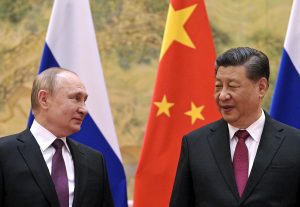Chinese President Xi Jinping hasn’t traveled internationally since the outbreak of the COVID-19 pandemic in early 2020. More than two years later, his first official foreign visit seems to be at hand. The governments of Kazakhstan and Uzbekistan announced that Xi will soon travel to Kazakhstan for a state visit on September 14 and then onward to Samarkand to attend the Shanghai Cooperation Organization (SCO) annual summit September 15-16.
In Samarkand, Xi is expected to meet with Russian President Vladimir Putin on the sidelines of the SCO summit.
Xi and Putin are also reportedly planning to attend the G-20 summit in Indonesia in November, with the Chinese leader likely to visit to other Southeast Asian nations afterward.
For both leaders, the upcoming meetings are of critical geopolitical value.
Russia, since its invasion of Ukraine in February, has been under considerable international pressure. While China has not, in so many words, come out in support of the invasion, its actions have not targeted or punished Russia either. Instead, as Zhouran Li noted in an article in June, China has emphasized three messages in its diplomatic engagements since the invasion: “blaming NATO for the war, calling for negotiations to stop the war, and protesting Western sanctions against Russia.”
This is far more support for the Russian position than Moscow has garnered from the states of Central Asia. In broad terms, the Central Asian states have maintained a degree of measured neutrality in the Ukraine conflict. Kazakhstan, for example, has continued diplomatic engagements while also pledging to European leaders not to help Russia evade sanctions. On the global stage at the United Nations, the states of Central Asia have either abstained from critical votes or sided with Russia.
As for China, Beijing has received its own share of mounting criticism over Taiwan, Hong Kong, and Xinjiang. Russia, for its part, has refrained from criticizing China in these areas. As Beijing’s relationships with the West fray, Moscow remains a friend. In this way, although the relationship has its own dynamics, China and Russia share considerable strategic positions vis-a-vis the West, which draw them inextricably together.
It’s also notable that Xi chose Central Asia as the venue of his much-anticipated return to international travel. In some ways, it’s an obvious choice: close to home, allowing Xi to avoid any lengthy trips in the lead-up to the critical 20th Party Congress, and the site of an international summit that will help Xi maximize the impact of his time abroad. Yet it also confers an undeniable diplomatic importance to Central Asia. Xi’s first trip abroad in over two-and-a-half years was hotly debated last month, with rumors that he would be visiting Saudi Arabia or staying home until the G-20 summit in Indonesia. That he chose Kazakhstan in the end is another reminder of the crucial role Central Asia plays in China’s foreign policy.
The Chinese Foreign Ministry has not confirmed Xi’s upcoming travel to Central Asia. But in June, Foreign Minister Wang Yi traveled to Kazakhstan to attend the “China+Central Asia” (C+C5) Foreign Ministers’ Meeting. The following month, Wang returned to Central Asia, making stops in Uzbekistan, Kyrgyzstan, and Tajikistan.
Some view China’s increasing inroads into Central Asia as a possible threat to Russia, a potential flashpoint in their bonhomie. But for the time being, Central Asia is big enough for both Russia and China; Moscow and Beijing’s interests align enough that they are not pitted against each other in the region, either.
In early February 2022, before Russia’s invasion of Ukraine, Xi and Putin met in Beijing. China was hosting the Winter Olympics and some Western countries were staging a “diplomatic boycott.” In their bilateral meetings, China and Russia proclaimed a “no limits” strategic partnership. It’s within the context of that relationship that Xi will travel to Central Asia this month. The Central Asian region stands as a critical buffer, as well as a critical stage, for the China-Russia relationship.

































